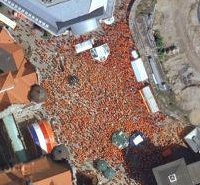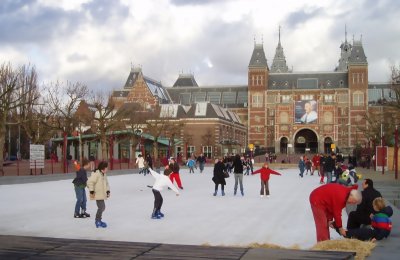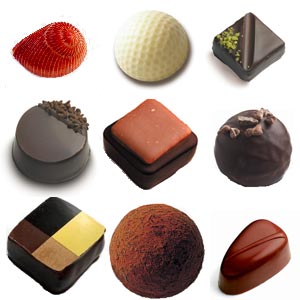 This image is a top down view of the Burgplatz (platz = square in German) in Leipzig on June 11, 2006 as seen on Google maps. We know the date, because all the people on the square are clad in orange, the colour that Dutch sports fans don whenever they wish to cheer on their national team. On June 11, the Dutch national football team was in Leipzig to play the team of Serbia-Montenegro during the 2006 world championships. The Dutch team won 1-0. (The red, white and blue flag across what I presume is the podium is a dead give away too, but probably not as visible from higher up as the orange square.)
This image is a top down view of the Burgplatz (platz = square in German) in Leipzig on June 11, 2006 as seen on Google maps. We know the date, because all the people on the square are clad in orange, the colour that Dutch sports fans don whenever they wish to cheer on their national team. On June 11, the Dutch national football team was in Leipzig to play the team of Serbia-Montenegro during the 2006 world championships. The Dutch team won 1-0. (The red, white and blue flag across what I presume is the podium is a dead give away too, but probably not as visible from higher up as the orange square.)
February 13, 2008
Dutch sports fans as seen from space
December 21, 2007
First “natural ice” speed skating race of the season in Nijelamer

Last Wednesday the Frisian village of Nijelamer was the first in the country to organise speed skating races on natural ice. On a 160-metre track, 38 pairs started, skating two races each: one away from the village and the second race towards it. The person losing both races was out of the competition. In the end, 21-year-old Ronald Mulder from Zwolle won. Two days earlier, skating icon Henk Angenent had expressed doubt on national TV as to whether natural ice races would be held this week. The farmer from Woubrugge had observed fresh mole hills and saw this as a sign that the frost would not stay. But it did, and the skating peloton was happy for it. (Via free daily De Pers, Dutch.)
Photo by StanTheCaddy, distributed under a Creative Commons BY-2.0 license: children skating at the back of the Rijksmuseum in Amsterdam in January 2007.
Tags: Friesland, natural ice, Rijksmuseum, skating, traits
June 11, 2007
Dutch women don’t get depressed

In a riff on the book ‘French Women Don’t Get Fat’, a book that explains how French women manage to avoid the treadmill of the gym by skipping along merrily from marché to marché carrying delightful baskets full of good wholesome food, (Dutch! female!) psychologist Ellen de Bruin has published a book called ‘Dutch Women Don’t Get Depressed’. The review in the International Herald Tribune seems to be toggling between the ideas that on the one hand the book is a parody, on the other, a serious work.
So why don’t Dutch women get depressed? The review hints at many a contorted explanation, dragging in several stereotypical views of Dutch society. Gay marriage gets a look in (suggesting the Dutch desire for family building) as does the Amsterdam Red Light District (suggesting sexual freedom). And an important element seems to be that Dutch women don’t feel the stress of the need to seduce, and instead dress in lumpy, gender-blurring clothes that are ideal for biking along windy canals.
Meanwhile English (female!) columnist Sarah Sands first discards the suggestion that an English version should be called ‘Why English Women Don’t Get Laid’, then gets bitter:
This is also a country that embraces euthanasia. All those elderly parents in old people’s homes must feel nervous about family visits. And if we have discovered the correct social conditions for human happiness, they are fragile. The cultural clash between Islam and the secular West has been fought ferociously on Dutch soil.
The main problem with this book is that it does not have the obvious appeal of French Women… Many of us would like to be French, at least on the outside. With respect, how many of us wish to be Dutch?
You tell ’em, fatty! ‘Ere, have some Belgian chocolate.
Tags: English, French, statistics, traits, women
April 27, 2007
Dutch humour at work not a big hit

It appears that major European managers do not appreciate Dutch humour. Only 4% of top managers think the Dutch are funny, according to this year’s UPS Europe Business Monitor. Some 1,450 top managers from seven European countries gave their opnion.
British humour came out on top. Some 34% of Belgians, French, Germans, Italians, Dutch, Spanish and British found the British the funniest. Interestingly enough, the biggest fans of British humour are the Brits themselves, as 59% chose their fellow countrymen. The Dutch and Germans aren’t funny, and the least funny of all are the Danish, Austrians and Swedes.
(Link)
Tags: british, humour, statistics, traits
